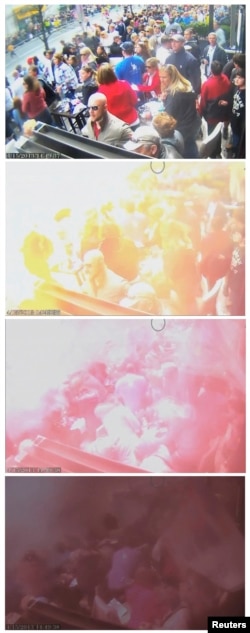Moments after being blasted into the air "like a rocket" in the Boston Marathon bombing, nurse Jessica Kensky saw that her husband's leg had been blown off and leaped into action, struggling to put a tourniquet on him, she testified on Monday.
Running on adrenaline, she did not realize the blast from one of the two homemade pressure-cooker bombs had set her back on fire, Kensky told jurors in the third day of accused bomber Dzhokhar Tsarnaev's federal trial in Boston.
"There was smoke, there was blood. I was most focused on my husband, he was right next to me still, and his foot and his leg were kind of detached," said Kensky. "A man came over as I was trying to fumble to put a tourniquet on Patrick and said, 'Ma'am you're on fire, you're on fire.'"
Tsarnaev, 21, is accused of killing three people and injuring 264, including Kensky, at the famed race's crowded finish line on April 15, 2013.
Kensky lost her left leg on the day of the bombing. Her right leg was amputated in January of this year because it had failed to heal from injuries sustained in the blast.
She and her husband, Patrick Downes, were taken to separate hospitals and did not see each other for two weeks until a volunteer medical crew brought her to visit him.
Tsarnaev's attorneys opened their case last week by bluntly declaring that the defendant and his older brother were responsible for the attack as well as the fatal shooting of a police officer three days later, in an effort to focus attention on the brother's role in the plot.
The jury on Monday viewed video taken by security cameras near the race's finish line on Boylston Street showing Tsarnaev walking with a backpack that prosecutors contend held a bomb, leaving it in a crowd in front of a restaurant, making a brief phone call and walking away shortly before the blast.
Defense lawyers contend that Tamerlan Tsarnaev, 26, who died following a gunbattle with police three days after the bombing, was the driving force behind the attack, with Dzhokhar following along out of a sense of submission. By pinning the bulk of the blame on the older brother, defense lawyers hope to persuade the jury in U.S. District Court in Boston not to sentence their client to death.
Prosecutors maintain that the defendant also read jihadist magazines online and "believed that he was a soldier in a holy war against Americans."
Despite his lawyers' admission of responsibility, Tsarnaev has not changed his plea from not guilty.
U.S. District Judge George O'Toole has worked to keep both defense and prosecution attorneys focused on direct evidence of Tsarnaev's guilt, leaving the question of how his responsibility compared with his brother's until the trial's sentencing phase.
The bombing killed Martin Richard, 8; restaurant manager Krystle Campbell, 29, and graduate student Lingzi Lu, 23. Massachusetts Institute of Technology police officer Sean Collier, 27, was shot to death three days later.
A friend of Lu's, fellow Chinese exchange student, Dan Ling Zhou, 24, testified that the pair were both badly injured by the blasts.
Zhou was brought to a hospital, where she drifted in and out of consciousness, asking about Lu when she woke.
"Every time I wake up, I ask them whether or not they find her," Zhou testified. "So I ask again. And she says, 'Oh,' she says, 'She passed away. You don't know that?' So I guess everyone found out earlier. But they were trying to protect me, so they didn't tell me."






